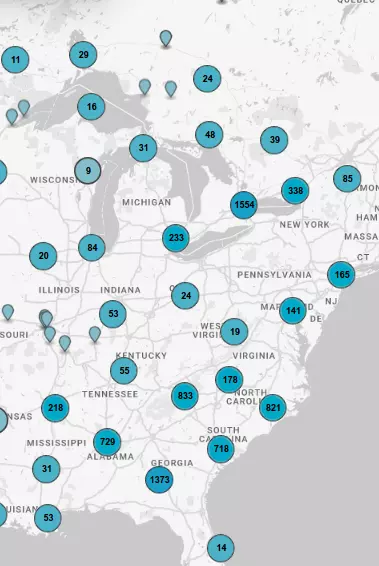Yellowhead Pass
Name after 'Tete Jaune', blond fur trader at Jasper House, this low pass was favoured by Sanford Fleming in his railway surveys of the 1870's. Rejected by the C.P.R., the route was later used by...
- british columbia
- canada
No. 1 Mine
Nanaimo was founded as a coal-mining settlement in 1852. Its most productive mine, No. 1, opened in 1881. From the bottom of the main shaft, one-half mile south of here, a labyrinth of...
- british columbia
- canada
Point Ellice House
This historic residence, built in 1861, was the home of the Honourable Peter O'Reilly. As Gold Commissioner, County Court Judge and member of the first Legislative Council of British Columbia,...
- british columbia
- canada
Cariboo Wagon Road (Sign missing)
It was one of the most difficult construction jobs in the British Empire, but the colony needed this road to the Cariboo goldfields. From 1861 to 1863 the small body of Royal Engineers sent...
- british columbia
- canada
Britannia Mine
From 1930-35, these mines were the British Empire's largest producers of copper. Originally prospected by Dr. A.A. Forbes in 1888, the ores of the Britannia Range were first staked in 1897...
- british columbia
- canada
Wellington
In 1869 Robert Dunsmuir discovered coal in this area. The settlement of Wellington developed after 1871 when coal was transported first by wagon and later by rail to the wharves at Departure...
- british columbia
- canada
Coldstream Valley
The valley's potential was seen by Forbes and Charles Vernon in 1863, when travelling to silver claim staking 40 miles to the east. In 1864, the brothers pre-empted across the lake 1000...
- british columbia
- canada
B.C. Paper Manufacturing Co. (Sign missing)
The first paper mill in BC was built on the Somass River in 1894. The small water-powered plant was able to produce 50 tons of paper a day using rags, rope and ferns as raw material....
- british columbia
- canada
Wharf Street (Sign missing)
From a muddy trail fronting Fort Victoria's palisades, this street changed with the maturing city. In the 1850's, Hudson's Bay Co. ships loaded firs while moored to the shore. In the 1860's, gold...
- british columbia
- canada
Engineers' Road
A wagon road across B.C. - this was the ambitious scheme of the Royal Engineers in 1860 as miners clamored for better access to the Southern Interior. Sent from England, these military engineers...
- british columbia
- canada
Government House (Sign missing)
The official residence of Colonel R.C. Moody, R.E., was built near this site in 1859. In 1864 it was altered to become the Government House of the Mainland Colony of British Columbia and was...
- british columbia
- canada
O'Keefe Ranch
One of the earliest cattle empires in the Okanagan began in 1867 when Cornelius O'Keefe and Thomas Greenhow drove cattle from Oregon to the north end of Okanagan Lake. In 1868 O'Keefe homesteaded...
- british columbia
- canada
Grand Trunk Pacific
The last spike in Canada's second trans- continental railroad was driven near this site on April 7, 1914. The Grand Trunk Pacific became the most important factor in the dvelopment of...
- british columbia
- canada
The Mighty Fraser
Our past, present, and future are linked with the Fraser. The past saw fur-traders, the gold rush of 1858, and early settlers. The present sees water teeming with migrating salmon and highway...
- british columbia
- canada
Pacific Great Eastern (Sign missing)
The P.G.E. derived its name from England's Great Eastern Railway. Begun by private interests in 1912, it was acquired by the province in 1918 when the builders ran into financial...
- british columbia
- canada
Vernon Military Camp
Trumpets first sounded here in 1908 calling the Okanagan's cavalry to muster. Joined by infantry battalions, thousands of militiamen and cadets from all over the province came to know Mission Hill...
- british columbia
- canada
Overland Telegraph
Perry Collins, an American, evnisioned a land route to link America and Asia by telegraph. All attempts to lay a cable across the Atlantic had failed. Western Union had completed 800...
- british columbia
- canada
Bridging the Cottonwood (Sign missing)
Plans to complete the Pacific Great Eastern Railroad to Prince George in 1921 failed because instable ground prevented use of the proposed bridge site on the Cottonwood River. Thus construction...
- british columbia
- canada
The Fraser Delta (Sign missing)
About a mile beneath the river in front of you lies the old rock floor of this valley. For over 50 million years the Fraser, interrupted by periods of glaciation and mountain building, has carried...
- british columbia
- canada
Port Moody
Colonel R.C. Moody, R.C., recognized the potential value of Burrard Inlet for military defence. Named in his honour, Port Moody became the western terminus of the Canadian Pacific Railway....
- british columbia
- canada
